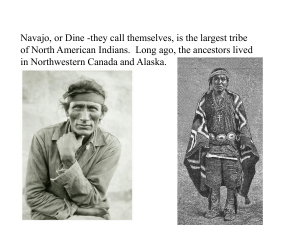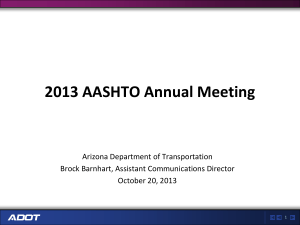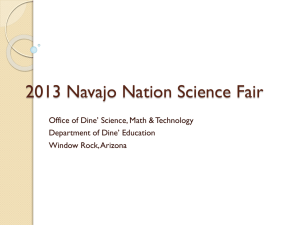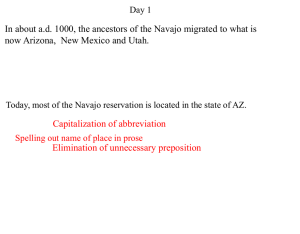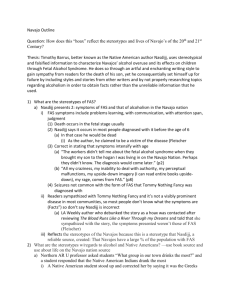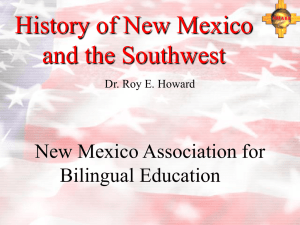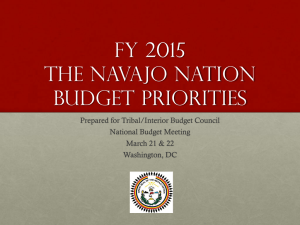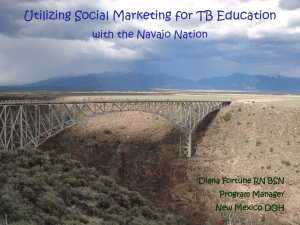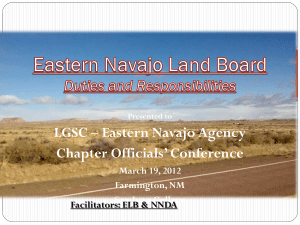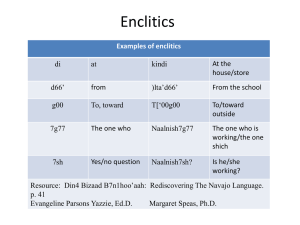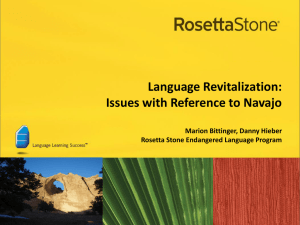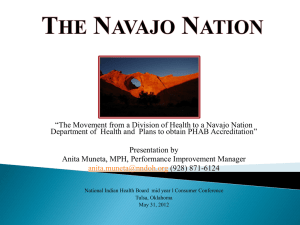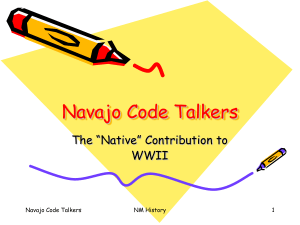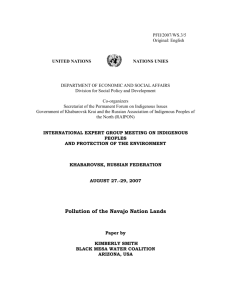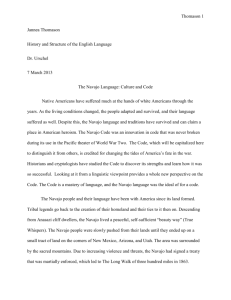Regional Presentations FY2014 Navajo
advertisement
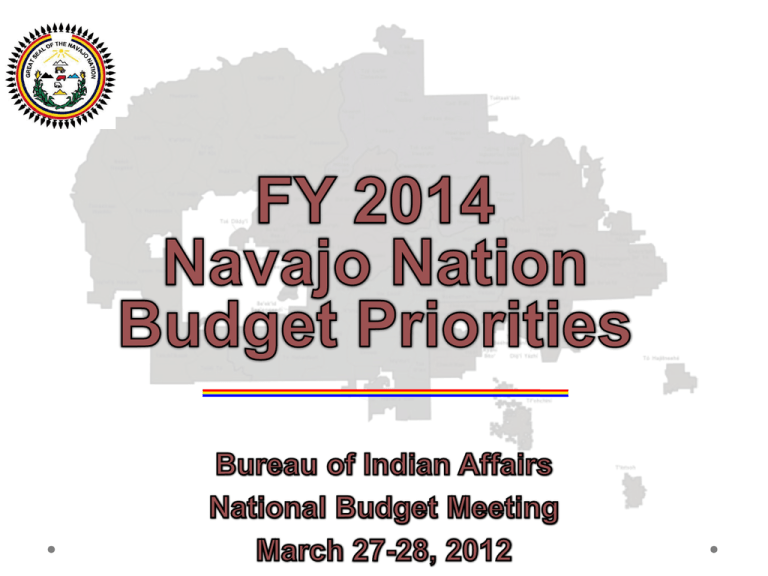
Navajo Nation Priorities Presented here are the Navajo Nation FY 2014 Budget of Indian Affairs and Bureau of Indian Education budget priorities: 1. 2. 3. 4. Public Safety and Justice Human Services Education Natural Resources Management The Navajo Nation priorities are based upon the need to enhance and sustain the cultural, economic, social and governmental vitality of the Navajo people. A government-to-government relationship exists between the Navajo Nation and the U.S. government. This relationship is based upon our sacred Treaty of 1868 with the U.S. government, the Snyder Act of 1921, the Indian SelfDetermination and Education Assistance Act, as amended and other similar federal laws, which authorize federal appropriations to the Navajo Nation for the benefit of the Navajo people. Law Enforcement Patrol Criminal Statistics – FY 2011 Part I – Felony 3,787 Part II – Misdemeanor 204,866 Total 208,653 Annual Arrest: 28,977 Violent Crime: Property Crime: 2,689 Vandalism: 4,097 Disorder Conduct: 10,181 Drunkenness: 33,523 DWI: 6,479 Domestic Violence: 4,700 Call for Services: 250,000 Average Response Time (min) 25 Jail Beds 48 280 commissioned officers cover an area of 27,000 square miles 1,098 Operational Information Annual Budget: $16,000,000 Actual Budget Need: $22,000,000 SHORTFALL: $6,000,000 Tribal Courts FY 2014 P.L. 93-638 BUDGET REQUEST: $3,423,000 The Judicial Branch provides stability in the Navajo Nation government by providing services through: • Tribal Courts • Peacemaking • Probation & parole Pursuant to Diné bi beenahaz’áanii, the Judicial Branch has developed a justice system that fully embodies the traditional values and processes of the Navajo People in accordance with Navajo Nation laws, customs, traditions, and applicable federal laws. Human Services The service area for the Navajo Nation P.L. 93-638 Social Services contract covers the Navajo Nation and border towns. Navajo 93-638 social workers 35:1 : 217 miles The National Child Welfare League of America 15:1. : 332 miles Social Services Human Services Housing Improvement Program Project Accomplishments Completed Projects Before and After No. of Projects # of Applicants 693 684 626 584 509 8 1.1 million 8 1.0 million 509 10 22 13 2.3 million 1.0 million 1.5 million 44 2.6 million The Housing Improvement Program is NOT a duplication of HUD NAHASDA. NAHASDA has income requirements – HIP serves the neediest individuals that have no other alternative for housing. HIP typically serves elderly and handicapped individuals needing homes and improvements Human Services Welfare Assistance • • • • • Navajo 93-638 Social Services considers the use of welfare assistance funds as “Family Support Assistance,” with the intent to promote family unity. Welfare assistance funds are utilized when no other comparable services are available. Welfare assistance funds prevent eligible Navajo families from “falling through the cracks,” when in need of financial assistance and residential care. Family reunification and deinstitutionalization are goals when purchasing residential care services for children, youth, adults, and elderly. All welfare assistance services are offered to eligible Navajos in a context of cultural relevancy. “Family Support Assistance” Education FY 2014 Budget Request $34.7 million additional funds requested; 2009-2012 Total Applicants 20,000 18,000 17,291 17,395 17,001 $12.2 annually is not sufficient to support the increasing number of students that apply for funding every year; and 16,000 14,000 12,000 10,000 8,000 6,000 5,436 Cost of education is also consistently rising. Additional funds are needed to support the increasing cost of inflation. 5,266 4,000 2,000 0 2010 Total Applicants 2011 2012 Students Funded from Federal Funds Johnson-O’Malley Program In fiscal year 2012: • Conducted 31 public school district fiscal and programmatic monitoring in Ariz., N.M. and Utah; • Increased student enrollment; • Provided supplemental funding (25 CFR) to schools to meet unique and specialized opportunities: According to the U.S. Census Bureau almost 70 percent of Navajos speak their tribal language in the home. In contrast, only 30 percent of Native Americans as a whole speak their own tribal language in the home. Tutoring, educational field trips Increased attendance and academic performance At-risk counseling Summer school Promoted native studies including language and culture preservation Required school items Resource Management • Navajo Indian Irrigation Project o Under P.L. 87-483 the Federal Government promised to fully fund NIIP o The Navajo Nation gave up water rights as a part of this deal o NIIP should be fully funded at $26 m per year to fulfill the federal government obligation • Bennett Freeze should be funded under its own line item not as part of Natural Resource Management o Fund under a separate line item (as was done in 2011) for $1.2 m Conclusion • The Navajo Nation has an obligation to serve the needs of it’s citizens just as the federal government has an obligation to fulfill its trust responsibility • For this reason the Navajo Nation requests: o Contract Support (TPA) costs need to be fully funded (currently at 85%) o Tribal Grant Contract Support costs need to be fully funded (currently at 65%) • Native Nations should be considered in practice MANDATORY/NON DISCRETIONARY FUNDING not subject to reductions under the Deficit Reduction Act. • Treaty obligations are not discretionary they are legal compacts.
